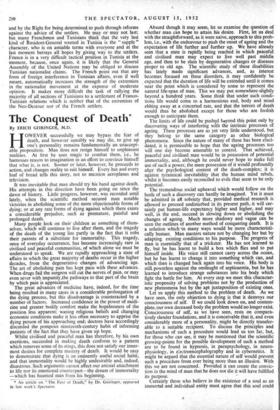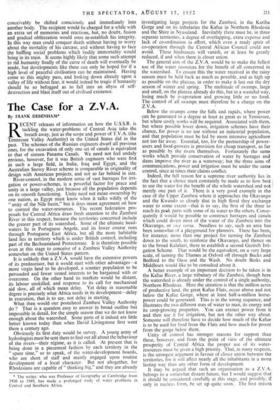The Conquest of Death*
By ERICH GEIRINGER, M.D.
HOWEVER successfully we may bypass the fear of death, and however sensibly we may die, to give up one's personality remains fundamentally an unaccept- able proposition. Man does not resign himself to unpleasant realities. At first he uses magic to combat them, i.e., he harnesses reason to imagination in an effort to convince himself that what is, is not. Sooner or later, however, he proceeds to action, and changes reality to suit himself. Every hut and every loaf of bread tells this story, not to mention aeroplanes and television.
It was inevitable that man should try his hand against death. His attempts in this direction have been going on since the dawn of history. Little progress, however, was recorded until lately, when the scientific method secured man notable victories in abolishing some of the more objectionable forms of dying; or at any rate forms of dying against which there exists a considerable prejudice, such as premature, painful and prolonged death. Many people look on their children as something of them- selves, which will continue to live after them, and the tragedy of the death of the young lies partly in the fact that it robs their parents of a substitute for immortality. This tragedy, once of everyday occurrence, has become increasingly rare in civilised and peaceful communities, of which alone we must be understood to speak. We are rapidly approaching a state of affairs in which the great majority of deaths occur in the higher decades, from the degenerative changes of advancing age. The art of abolishing pain has kept pace with these advances. When drugs fail the surgeon will cut the nerves of pain, or may even sever with impunity,the pathways to that part of the brain by which pain is appreciated. The great advances of medicine have, indeed, for the time being resulted in many cases in a considerable prolongation of the dying process, but this disadvantage is counteracted by a number of factors. Increased confidence in the power of medi- cine and greater bodily comfort make the hopelessness of the position less apparent; waning religious ' beliefs and changing economic conditions make it less often necessary to apprise the dying person of his approaching end; doctors have accordingly discarded the pompous nineteenth-century habit of informing patients of the fact that they have given up hope. Whilst civilised and peaceful man has therefore, by his own exertions, succeeded in making death conform to a pattern which removes some of its stings, this does not satisfy our inner- most desires for complete mastery of death. It would be easy to demonstrate that dying is an eminently useful social habit, and that immortality would be highly undesirable and, indeed, disastrous. Such arguments cannot affect our animal attachment to life nor its emotional c'ounterpart—the dream of immortality —which has haunted man from his beginning.
* An article on "The Fear of Death," by Dr. Geiringer, appeared in last week's Spectator. Absurd though it may seem, let us examine the question of whether man can hope to attain his desire. First, let us deal with the straightforward, as it were naive, approach to this prob- lem, i.e., with the endeavour to push the onset of ageing and the expectation of life further and further up. We have already seen that a state is rapidly being reached in which peaceful and civilised man may expect to live well past middle age, and then to be slain by degenerative changes or diseases proper to old age. The scientific study of these disabilities has lately made significant advances, and, as interest becomes focused on these disorders, it may confidently be , expected that the duration of life will be extended until it comes near the point which is considered by some to represent the natural life-span of man. This we may put somewhere-slightly beyond a hundred years. Some think that under such condi- tions life would come to a harmonious end, body and mind ebbing away at a Concerted rate, and that the terrors of death would thus be abolished except for those who are foolish enough to anticipate them.
The limits of life could be pushed hoyond this point only by discovering ways of interfering with the intrinsic processes of ageing. These processes are as yet very little understood, but they belong to the same category as other biological phenomena. Since the nature of many of these has been eluci- dated, it is permissible to hope that the ageing processes too will one day become amenable to control. That achieved, peaceful and civilised man would be in possession of potential immOrtality, and, although he could never hope to make full use of such a power, the mere possession of it would profoundly alter the psychological content of the death-complex; it is against tyrannical inevitability that the human mind rebels, whilst it becomes easily reconciled to evils that seem to be only potential. The tremendous social upheaval which would follow on the heels of such a discovery can hardly be imagined. Yet it must be admitted in all sobriety that, provided medical research is allowed- to proceed undisturbed in its present path,- it will cer- tainly put human-life expectancy higher and higher, and may well, in the end, succeed in slowing down or abolishing the changes of ageing. Much more shadowy and vague can be seen the outlines of another method of conquering death. It is a solution which in Many ways would be more characteristi- cally human. Man masters nature not by changing her but by adapting existing conditions to his purpose. _ The progress of man is essentially that of a trickster. He has not learned to fly, but he has learnt to build a box which ffies and to put himself inside. His voice still cannot carry across the ocean, but he has learnt to change it into something which can, and which then is changed back again into his voice. His body is still, powerless against the onslaught of septicaemia, but he has learned to introduce strange substances into his body which fight the battle for him. At every step we meet this character- istic propensity of solving problems not by the production of new phenomena but by the apt juxtaposition. of existing ones.
Let us apply this method to the problem of death. As we have seen, the only objection to dying is that it destroys our consciousness of self. If we could look down on, and contem- plate, our own deceased body the problem would no longer exist. Consciousness of self, as we have seen, rests on compara- tively slender foundations, and it is conceivable that it, and even considerably more of a personality, might be directly transfer- able to a suitable recipient. To discuss the principles and mechanisms of such a procedure would lead us too far, but, for those who can see, it may be mentioned that the scientific growing-points for the possible development of such a method are to be found in hypnosis, in parapsychology, in neuro- physiology, in e:ectroencephalography and in cybernetics. It might be argued that the essential nature of self would prevent such a procedure from ever being more than an illusion. With this we are not concerned. Provided it can create the convic- tion in the mind of man that he does not die it will have fulfilled its purpose.
Certainly those who believe in the existence of a soul as an immortal and individual entity must agree that this soul could conceivably be shifted consciously and immediately into another body. The recipient would be charged for a while with an extra set of memories and reactions, but, no doubt, fusion and gradual obliteration would soon re-establish his integrity. In this way man could conquer death without having to worry about the mortality of his carcase, and without having to face the baffling social problems which bodily immortality would bring in its train. It seems highly likely that some such attempt to rid humanity finally of the curse of death will eventually be made, but developments like these can only be hoped for if a high level of peaceful civilisation can be maintained. Having come to this mighty pass, and looking down already upon a valley of life without fear, it would indeed be tragic if humanity should be so befogged as to fall into an abyss of self- destruction and blast itself out of civilised existence.



























 Previous page
Previous page